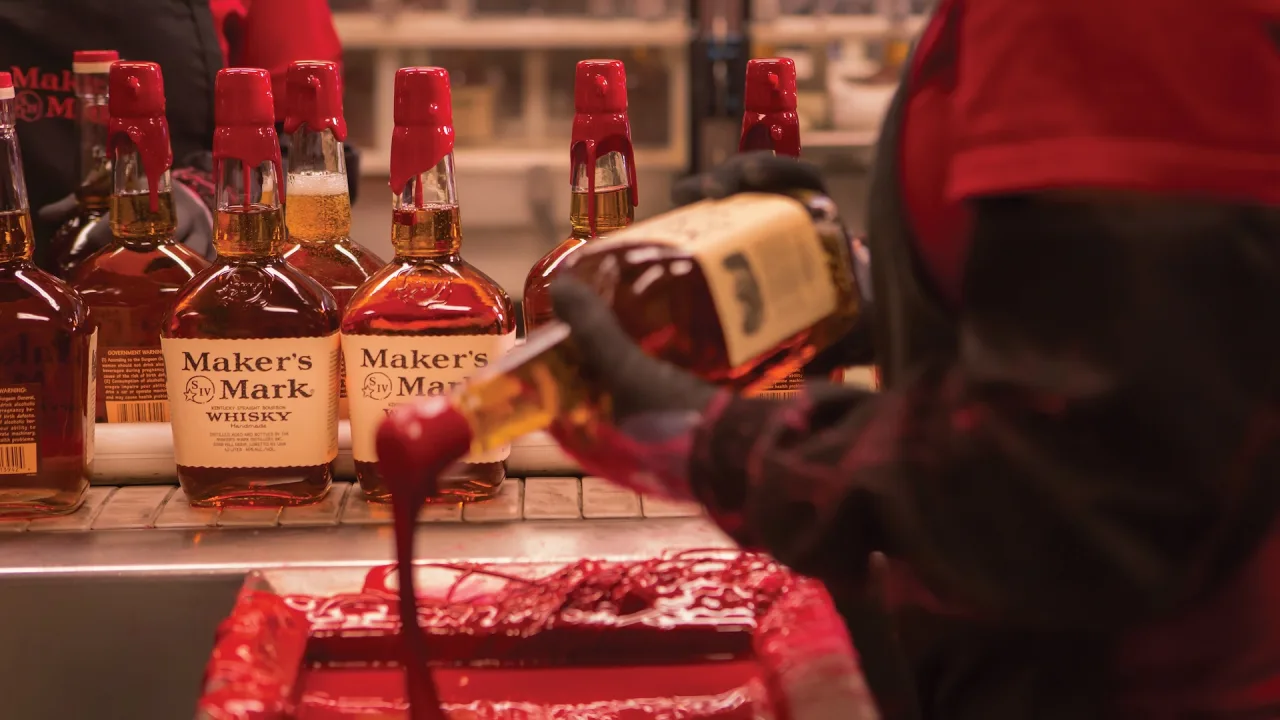A spirit of sustainability
Rob Samuels, managing director of Maker’s Mark—the company that makes the popular bourbon with the distinctive red wax-dipped bottles—is a firm believer in sustainable farming practices. Because, it turns out, what’s good for the planet is also good for delivering flavor. And that holds true for the wheat, corn, and barley that arrive at the Maker’s Mark distillery in Loretto, Kentucky, sourced from a collection of local farmer partners. “The bourbon in your glass is agricultural,” Samuels says. It was an exploration of flavor and subsequent understanding of the benefits of growing high-quality crops utilizing methods that improved soil health and increased biodiversity that inspired Samuels to embrace a regenerative farming model. Today, 86% of the crops used in Maker’s Mark bourbon are certified as regeneratively grown and sourced, and the brand has vowed to reach 100% by the end of 2025. A firm commitment to quality, innovation, and sustainability—the company was the first bourbon distillery in Kentucky to meet the high standards in social and environmental responsibility for B Corp certification—has earned Maker’s Mark a spot on Fast Company’s list of the Best Workplaces for Innovators in 2024. LEGEND, LEGACY, AND LOOKING AHEAD You don’t have to be a whiskey drinker to recognize Maker’s Mark signature bottle. But the brand wasn’t always a household name. In the 1950s, most distilleries, Samuels says, made “blow-your-ears-off cowboy whiskey.” His grandparents founded Maker’s Mark—according to family legend, they burned the 170-year-old family recipe and began work on what would become a wonderfully balanced handmade spirit—a bourbon “so delicious, you’d want to share it with friends.” For almost 30 years following the opening of the distillery, Maker’s Mark was a Kentucky-only brand, supplying cases to fellow Bluegrass State customers, like Keeneland Racetrack. Today, the brand sells more than 3 million cases around the world. The far-sighted courage of his grandparents to break with tradition still guides Samuels today. “Every aspect of how we lead this brand is navigated by the founders’ North Star,” Samuels explains. “Their vision for higher purpose and community was foundational to the brand since day one.” A CULTURE ROOTED IN COMMUNITY That vision informed Samuels’s decision to pursue partnerships in the community that benefit the broader bourbon industry. In addition to its focus on regenerative farming, Maker’s Mark works with the University of Kentucky to conduct genome mapping of the oak species used to make the barrels in which bourbon is aged. That research will yield information that can better protect the trees—and inspired the two organizations to establish a repository of nearly 10,000 American White Oaks (with a thousand new saplings planted at the company’s Star Hill Farm every year). Maker’s Mark is part of Suntory Global Spirits, which has initiated several sustainability goals for the next five years. These include: further embedding regenerative agriculture practices, planting more trees than are harvested for barrels, and using 100% recyclable packaging across the company’s packaging portfolio. Achieving these goals has become a teamwide effort at Maker’s Mark, in which all are encouraged to contribute. A maintenance team member recently suggested using perforated cardboard to package items in the distillery’s gift shop. That idea has reduced the amount of waste passed on to consumers, while making it easier to recycle. Another team member inspired the distillery to pulverize all waste glass onsite—the resultant material is now used to irrigate gardens and as a filler in local road construction. This kind of input and engagement is thrilling to Samuels. Employees, he maintains, have always been at the core of the bourbon brand’s success, and their ideas play a key role in driving innovation at Maker’s Mark. “It’s at the center of how all our team members do what they do, every single day.”

Rob Samuels, managing director of Maker’s Mark—the company that makes the popular bourbon with the distinctive red wax-dipped bottles—is a firm believer in sustainable farming practices. Because, it turns out, what’s good for the planet is also good for delivering flavor. And that holds true for the wheat, corn, and barley that arrive at the Maker’s Mark distillery in Loretto, Kentucky, sourced from a collection of local farmer partners. “The bourbon in your glass is agricultural,” Samuels says.
It was an exploration of flavor and subsequent understanding of the benefits of growing high-quality crops utilizing methods that improved soil health and increased biodiversity that inspired Samuels to embrace a regenerative farming model. Today, 86% of the crops used in Maker’s Mark bourbon are certified as regeneratively grown and sourced, and the brand has vowed to reach 100% by the end of 2025.
A firm commitment to quality, innovation, and sustainability—the company was the first bourbon distillery in Kentucky to meet the high standards in social and environmental responsibility for B Corp certification—has earned Maker’s Mark a spot on Fast Company’s list of the Best Workplaces for Innovators in 2024.
LEGEND, LEGACY, AND LOOKING AHEAD
You don’t have to be a whiskey drinker to recognize Maker’s Mark signature bottle. But the brand wasn’t always a household name. In the 1950s, most distilleries, Samuels says, made “blow-your-ears-off cowboy whiskey.”

His grandparents founded Maker’s Mark—according to family legend, they burned the 170-year-old family recipe and began work on what would become a wonderfully balanced handmade spirit—a bourbon “so delicious, you’d want to share it with friends.” For almost 30 years following the opening of the distillery, Maker’s Mark was a Kentucky-only brand, supplying cases to fellow Bluegrass State customers, like Keeneland Racetrack. Today, the brand sells more than 3 million cases around the world.
The far-sighted courage of his grandparents to break with tradition still guides Samuels today. “Every aspect of how we lead this brand is navigated by the founders’ North Star,” Samuels explains. “Their vision for higher purpose and community was foundational to the brand since day one.”
A CULTURE ROOTED IN COMMUNITY
That vision informed Samuels’s decision to pursue partnerships in the community that benefit the broader bourbon industry. In addition to its focus on regenerative farming, Maker’s Mark works with the University of Kentucky to conduct genome mapping of the oak species used to make the barrels in which bourbon is aged. That research will yield information that can better protect the trees—and inspired the two organizations to establish a repository of nearly 10,000 American White Oaks (with a thousand new saplings planted at the company’s Star Hill Farm every year).
Maker’s Mark is part of Suntory Global Spirits, which has initiated several sustainability goals for the next five years. These include: further embedding regenerative agriculture practices, planting more trees than are harvested for barrels, and using 100% recyclable packaging across the company’s packaging portfolio. Achieving these goals has become a teamwide effort at Maker’s Mark, in which all are encouraged to contribute. A maintenance team member recently suggested using perforated cardboard to package items in the distillery’s gift shop. That idea has reduced the amount of waste passed on to consumers, while making it easier to recycle. Another team member inspired the distillery to pulverize all waste glass onsite—the resultant material is now used to irrigate gardens and as a filler in local road construction.
This kind of input and engagement is thrilling to Samuels. Employees, he maintains, have always been at the core of the bourbon brand’s success, and their ideas play a key role in driving innovation at Maker’s Mark. “It’s at the center of how all our team members do what they do, every single day.”






















